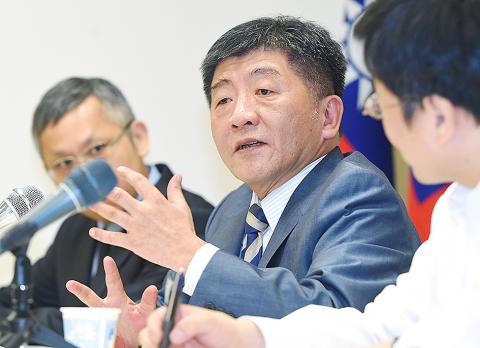Despite the lack of an official invitation, a Taiwanese delegation is to leave at midnight tomorrow for the World Health Assembly (WHA) in Geneva, Switzerland, the Ministry of Health and Welfare said yesterday.
The government will work with health and medical associations from around the world to host forums outside the assembly meeting that focus on issues related to antibiotic resistance, dental care for elderly patients and strengthening healthcare systems, said Minister of Health and Welfare Chen Shih-chung (陳時中), who is to lead the delegation.
The topic of this year’s WHA meeting is universal health coverage and as Taiwan is a world leader in universal health coverage, it us to jointly host with the World Medical Association a forum on the topic, he said.

Photo: Liao Chen-huei, Taipei Times
Chen also responded to a statement by China’s Taiwan Affairs Office yesterday, which said that Taiwan did not receive an invitation because the Democratic Progressive Party government refuses to acknowledge the so-called “1992 consensus,” and accused Taiwan of “playing the sympathy card” to gain support from other nations.
“We are going to the WHA to make contributions and are not playing the ‘sympathy card,’” Chen said. “We are playing the ‘anger’ and ‘soft power’ cards. [China] should not use politics to harm the interests of Taiwanese.”
The “1992 consensus” refers to a tacit understanding between the Chinese Nationalist Party (KMT) and the Chinese Communist Party that there is “one China,” with each side having its own interpretation as to what “China” means.
The government is dissatisfied and disappointed at the lack of an invitation, Chen said, adding that the nation’s allies are to make strongly worded statements at the assembly to protest the decision to exclude Taiwan.
Nevertheless, the delegation would seek to have more exchanges with healthcare officials worldwide to teach more nations about Taiwan’s medical achievements, Chen said.
Although Taiwan is not a WHO member, it would score 85 points on the organization’s public risk indicator, which would place it in the same category as Japan, South Korea, Canada, Singapore and other nations with quality healthcare systems.
“If I run into the WHO secretary-general this year, I will directly ask him why his organization decided to disregard the health of 23 million Taiwanese,” Chen said.

A Ministry of Foreign Affairs official yesterday said that a delegation that visited China for an APEC meeting did not receive any kind of treatment that downgraded Taiwan’s sovereignty. Department of International Organizations Director-General Jonathan Sun (孫儉元) said that he and a group of ministry officials visited Shenzhen, China, to attend the APEC Informal Senior Officials’ Meeting last month. The trip went “smoothly and safely” for all Taiwanese delegates, as the Chinese side arranged the trip in accordance with long-standing practices, Sun said at the ministry’s weekly briefing. The Taiwanese group did not encounter any political suppression, he said. Sun made the remarks when

The Taiwanese passport ranked 33rd in a global listing of passports by convenience this month, rising three places from last month’s ranking, but matching its position in January last year. The Henley Passport Index, an international ranking of passports by the number of designations its holder can travel to without a visa, showed that the Taiwan passport enables holders to travel to 139 countries and territories without a visa. Singapore’s passport was ranked the most powerful with visa-free access to 192 destinations out of 227, according to the index published on Tuesday by UK-based migration investment consultancy firm Henley and Partners. Japan’s and

BROAD AGREEMENT: The two are nearing a trade deal to reduce Taiwan’s tariff to 15% and a commitment for TSMC to build five more fabs, a ‘New York Times’ report said Taiwan and the US have reached a broad consensus on a trade deal, the Executive Yuan’s Office of Trade Negotiations said yesterday, after a report said that Washington is set to reduce Taiwan’s tariff rate to 15 percent. The New York Times on Monday reported that the two nations are nearing a trade deal to reduce Taiwan’s tariff rate to 15 percent and commit Taiwan Semiconductor Manufacturing Co (TSMC, 台積電) to building at least five more facilities in the US. “The agreement, which has been under negotiation for months, is being legally scrubbed and could be announced this month,” the paper said,

NATIONAL SECURITY THREAT: An official said that Guan Guan’s comments had gone beyond the threshold of free speech, as she advocated for the destruction of the ROC China-born media influencer Guan Guan’s (關關) residency permit has been revoked for repeatedly posting pro-China content that threatens national security, the National Immigration Agency said yesterday. Guan Guan has said many controversial things in her videos posted to Douyin (抖音), including “the red flag will soon be painted all over Taiwan” and “Taiwan is an inseparable part of China,” while expressing hope for expedited “reunification.” The agency received multiple reports alleging that Guan Guan had advocated for armed reunification last year. After investigating, the agency last month issued a notice requiring her to appear and account for her actions. Guan Guan appeared as required,